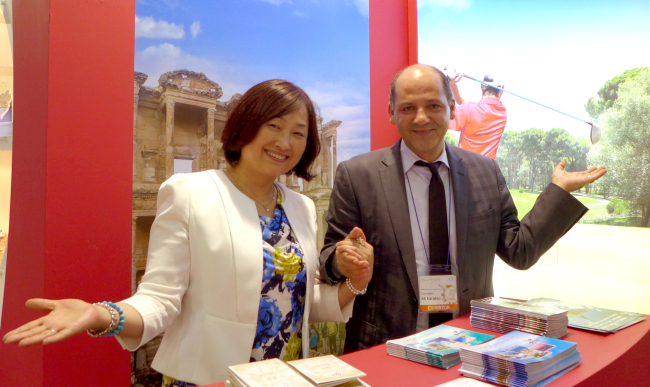Although describing Turkey as a bridge between the East and West has long been a cliche, the country continues to offer connections for people from every corner of the world.
Turkey has shorelines on the Mediterranean Sea and Black Sea, towns and villages with eclectic architecture and world-class ski resorts and golf courses.
 |
Ali Karakus, the director of the Turkish Embassy's office of culture an information, poses with Nas Communication CEO Na Eun-Kyung at the Korea Travel Fair 2015 at Coex in Seoul on June 11. (Joel Lee/The Korea Herald) |
Visitors can ski one day and sunbathe the next, watch the dervishes whirl before going clubbing, and stroll through a centuries-old bazaar before visiting a modern shopping center next door.
According to Ali Karakus, the director of the Turkish Embassy’s office of culture and information, Korean tourists have been missing out on the full spectrum of travel options in Turkey.
“Perhaps due to the tourism agency’s choices, Koreans have visited limited areas in Turkey ― Istanbul, Cappadocia and Pamukkale. This is only 10 percent of what we have to offer,” Karakus told The Korea Herald at the Korea Travel Fair 2015 at Coex in Seoul on June 11.
“If visitors spend extra time touring nearby areas of the hotspots, they will experience the full depth of Turkey’s attractions, including outdoor activities, local food, customs and festivals.”
The director recommended western Turkey, particularly the southern province of Antalya, known as the Turkish Riviera.
 |
Lake Egirdir in western Turkey. (Turkish Tourism Ministry) |
Because of its white sandy beaches, aqua-blue coves, ancient ruins and untouched countryside, the region has been a magnet for international tourists and honeymooners.
It is the No. 2 destination in Turkey, attracting 11.5 million tourists last year, especially from Germany, Russia, Netherlands and the United Kingdom.
Antalya has 197 beaches that qualified for the Blue Flag international award given to safe and clean beaches, marinas and boats. It has many beach resort towns nearby that are lined with luxury hotels, waterfront bars and restaurants and shopping facilities.
Turkey is also an emerging destination for golf tourism. The Belek region in Antalya province has 17 golf clubs and 50 five-star hotels along the coastline.
Straddling Asia and Europe both physically and psychologically, Turkey combines diverse ingredients and recipes into its cuisine, making it one of the world’s richest gastronomies, the director said.
Food and drinks shape people’s experiences of visiting a place, argued Karakus, while pointing out that both Turkish coffee and Korean kimchi were added to the UNESCO Intangible Cultural Heritage list in recent years.
“What I observed from Koreans is that they like to share things and foods with others, like Turks (do). Hospitality comes from sharing things,” he said. “Turks have gathered at cafes to drink coffee and smoke shisha since the mid-16th century, which formed our hospitable culture.”
Turkey aims to attract 50 million foreign tourists annually by 2023, which marks the 100th anniversary of the founding of the republic. Thirty-seven million international tourists visited Turkey last year.
One unique aspect of Turkey is that many cities are “open air museums” that display heritage as part of the cityscape. Many more heritage areas are undiscovered and awaiting archaeological excavation, he stressed.
Tourism makes up 10 percent of Turkey’s annual gross domestic product, and is a major source of income for the service industries.
“Turkey welcomes you. Our society is in harmony with the government to promote tourism,” Karakus said, adding that any newcomer to the country would be regarded as a full-fledged member of the community in less than 6 months.
The Turkish Airlines, Korean Air and Asiana Air provide direct flights to Turkey from Korea on a weekly basis.
By Joel Lee (
joel@heraldcorp.com)









